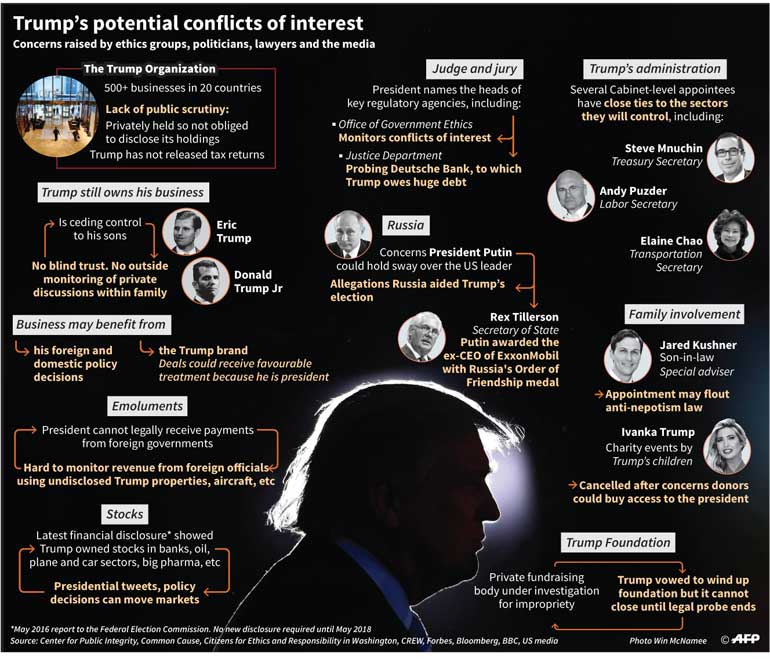Wednesday Feb 25, 2026
Wednesday Feb 25, 2026
Tuesday, 24 January 2017 00:05 - - {{hitsCtrl.values.hits}}
Reuters: A day after Donald Trump became U.S. President and vowed to put “America First”, Asian media decried his isolationist policies, fearing they will chill the global economy and sow widespread international discord.
In a defiant inaugural address, Trump said U.S. workers have been devastated by an outflow of jobs overseas, one of the main themes of a divisive campaign that emphasized making America strong again.
In Japan, one of Washington’s oldest and staunchest Asian allies, newspapers across the political spectrum criticised the new administration, with more than one saying the world was now in “unpredictable territory.”
“Has there ever been a new U.S. administration that began by spreading unease, not expectations, throughout the world?” said the conservative Yomiuri Shimbun, adding that Trump appeared ready to take both alliances and global norms lightly if they didn’t benefit the United States.
The liberal Asahi Shimbun went further and said Trump, who called on allies like Japan and South Korea to shoulder a greater share of defense costs or face the possible withdrawal of U.S. troops, posed a risk to the freer global order born after World War Two and the Cold War.

“Will the unpredictable Trump whirlwind cross the U.S. borders to spread division and conflict? The new master of the White House must realise the heavy responsibility that accompanies his words and actions”, it said.
State media in China, accused of stealing U.S. jobs during Trump’s campaign, said they hoped his government understood the importance of relations with China but that Beijing should also brace for the worst.
“What’s crucial is to control and manage disputes and find a way to resolve them,” said the overseas edition of the ruling Communist Party’s official People’s Daily.
Worry about friction between the two superpowers loomed over many in the region.
“As an exporting nation reliant on both China and the U.S., we would suffer from greater U.S. protectionism and any trade war,” said the Sydney Morning Herald.
“We may have to negotiate our way through a new world order not just regarding trade and China but also climate, Russia and regional security given Trump’s lack of interest in the U.S. playing the role of sheriff.”
A less-engaged Washington could also lead to shifting alliances and more reliance on regional networks.
“India must not only prepare for a more protectionist America, but also prepare of a United States that does not plan to mess around with other people’s affairs or squander blood and treasure in the name of promoting democratic values,” wrote policy analyst C. Raja Mohan, head of Carnegie India, in the Indian Express.
A few said they expected U.S. political institutions to prevail and that Trump should be given the benefit of the doubt as the duly-elected U.S. leader. “It is wisest to hope he succeeds,” added The Australian in an editorial titled “President Trump Seals the Deal.”
But uncertainty prevailed for the most part.
“Under Trump, the United States is apt to be as edgy and unpredictable as his former television reality show,” said Thailand’s The Nation on Friday.
“The reality show has become reality. We are about to discover whether America can become great again - and whether the word ‘great’ takes on unexpected meanings.”

Reuters: The new US administration of President Donald Trump said on Friday its trade strategy to protect American jobs would start with withdrawal from the 12-nation Trans-Pacific Partnership (TPP) trade pact.
A White House statement issued soon after Trump’s inauguration said the United States would also “crack down on those nations that violate trade agreements and harm American workers in the process.”
The statement said Trump was committed to renegotiating another trade deal, the North American Free Trade Agreement (NAFTA), which was signed in 1994 by the United States, Canada and Mexico.
“For too long, Americans have been forced to accept trade deals that put the interests of insiders and the Washington elite over the hard-working men and women of this country,” it said.
“As a result, blue-collar towns and cities have watched their factories close and good-paying jobs move overseas, while Americans face a mounting trade deficit and a devastated manufacturing base.”
The statement said “tough and fair agreements” on trade could be used to grow the US economy and return millions of jobs to America.
“This strategy starts by withdrawing from the Trans-Pacific Partnership and making certain that any new trade deals are in the interests of American workers.”
If NAFTA partners refused to give American workers a fair deal in a renegotiated agreement, “the President will give notice of the United States’ intent to withdraw from NAFTA,” the statement added.
The TPP, which the United States signed but has not ratified, had been the main economic pillar of the Obama administration’s “pivot” to the Asia-Pacific region in the face of a fast-rising China.
Proponents of the pact have expressed concerns that abandoning the project, which took years to negotiate, could further strengthen China’s economic hand in the region at the expense of the United States.
Australia’s position that a change of heart remains possible in the U.S. and that the trade deal can proceed, is unchanged despite the White House statement, Damon Hunt spokesman for the Australian prime minister, told Reuters on Saturday.
Trump has criticised China’s trade practices and threatened to impose punitive tariffs on Chinese imports.
The Chinese Government said on Thursday that China and the United States could resolve any trade disputes through talks, while a Chinese newspaper warned that US business could be targets for retaliation in any trade war ushered in by Trump.
Trump has sparked worries in Japan and the rest of the Asia-Pacific with his opposition to the TPP and his campaign demands for allies to pay more for their security.